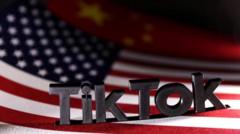In a development that signals the intensifying tech rivalry between the United States and China, Beijing announced on Tuesday its decision to ban the export of specific rare minerals to the U.S. This move directly follows the Biden administration’s recent expansion of restrictions on advanced technology sales to China. According to China’s Ministry of Commerce, the ban—which includes vital elements such as gallium, germanium, and antimony—was issued on national security grounds due to these minerals' military applications. Additionally, any export of graphite will undergo increased scrutiny.
**China Imposes Ban on Rare Mineral Exports to the U.S. Amid Escalating Tech Tensions**

**China Imposes Ban on Rare Mineral Exports to the U.S. Amid Escalating Tech Tensions**
China's restriction on rare mineral exports is a direct response to U.S. technology controls, marking a significant escalation in their ongoing trade conflict.
China is notably the leading global supplier of critical minerals essential for the production of advanced technologies like semiconductors, and it has been increasingly tightening its control over these resources. The new export restrictions come as a retaliation against the U.S.'s measures, including an October announcement that required exporters to provide details about how these minerals would be utilized within Western supply chains.
On the day prior to China's announcement, the Biden administration took significant steps to limit China’s technological advancement by prohibiting the sale of specific semiconductor chips and machinery, alongside expanding its restricted trade list to include over 100 Chinese companies. This move is part of a broader strategy by the current U.S. administration aimed at maintaining technological superiority and limiting China's progress in key sectors.
In response, China has labeled the U.S. actions as “illegal,” claiming that they undermine international economic order, destabilize global production chains, and negatively impact countries worldwide. Lin Jian, a spokesperson for China’s Ministry of Foreign Affairs, emphasized these concerns, highlighting the international ramifications of such trade decisions.
As both countries prepare for more stringent measures, the implications for global technology supply chains and economic dynamics remain uncertain, revealing the increasing complexity of international relations in a technologically driven world.
On the day prior to China's announcement, the Biden administration took significant steps to limit China’s technological advancement by prohibiting the sale of specific semiconductor chips and machinery, alongside expanding its restricted trade list to include over 100 Chinese companies. This move is part of a broader strategy by the current U.S. administration aimed at maintaining technological superiority and limiting China's progress in key sectors.
In response, China has labeled the U.S. actions as “illegal,” claiming that they undermine international economic order, destabilize global production chains, and negatively impact countries worldwide. Lin Jian, a spokesperson for China’s Ministry of Foreign Affairs, emphasized these concerns, highlighting the international ramifications of such trade decisions.
As both countries prepare for more stringent measures, the implications for global technology supply chains and economic dynamics remain uncertain, revealing the increasing complexity of international relations in a technologically driven world.





















